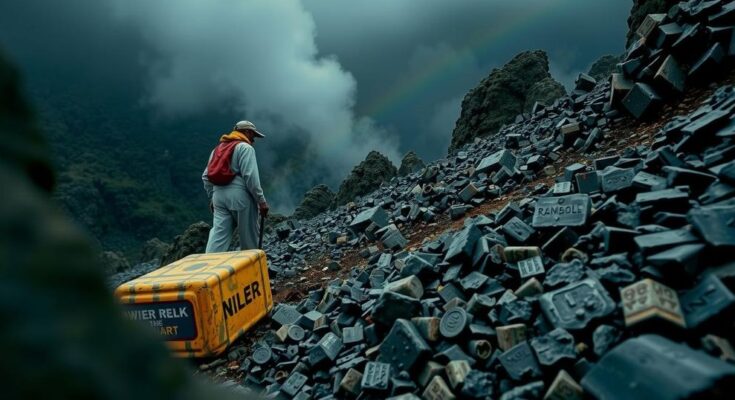Artisanal mining significantly contributes to the DRC’s economy, yet miners face critical health and safety risks due to inadequate training and lack of government action on promised reforms for formalization. Over 200,000 miners operate under hazardous conditions with minimal protective equipment, leading to exposure to toxic materials and the threat of radiation. Despite initiatives like the EGC aimed at improving conditions, progress remains largely unfulfilled, leaving miners to fend for themselves while necessitating urgent reforms and proper resource allocation to mitigate these dangers.
Artisanal mining plays a significant role in the Democratic Republic of Congo (DRC), constituting approximately 10-20% of the country’s copper and cobalt production. However, artisanal miners face severe health and safety threats, exacerbated by insufficient training and information. Despite government promises made as early as 2002 to formalize and improve conditions within the artisanal mining sector, notably towards its semi-industrialization, little tangible progress has been made even after two decades. In the Katanga region alone, around 200,000 individuals engage in artisanal mining using rudimentary tools and often operate in perilous conditions. The government’s commitment to establish a structured transition for these miners has yet to be fulfilled, as most mineral deposits remain under the control of industrial mining companies. Provisions in the 2018 Mining Code for allocating specific artisanal mining zones have not materialized, leaving many artisanal miners to operate illegally and frequently encroach upon areas designated for larger operations. Initiatives, such as the creation of the Entreprise générale du cobalt (EGC) in 2019, were aimed at formalizing the sector and ensuring compliance with social, economic, and environmental standards for artisanal miners. However, a significant allocation of land for artisanal mining has only been scheduled for 2024, causing concern among miners regarding job availability. The limited areas provided will barely meet the demands of the numerous miners in the Lualaba province. Artisanal miners operate under hazardous circumstances. Many perform their work without adequate protective gear, using basic tools in inadequately braced tunnels and are exposed to potential radioactive materials. A recent incident highlighted the risks of radiation exposure when shipments of copper and cobalt from the COMMUS project were returned due to high radioactivity levels detected in South Africa. Experts expressed concerns over the health implications arising from exposure to radioactive ores, especially given the prevalence of cancer among communities near mining operations, particularly in children. Furthermore, the environmental impact includes possible contamination of water sources and agricultural land, leading to adverse effects on local ecosystems and health. Efforts to mitigate these risks through training and awareness campaigns have been underscored by professionals in the field. The need for comprehensive education regarding safe mining practices and potential health hazards remains a pressing concern, which, if addressed, could significantly improve the circumstances and safety of those involved in artisanal mining in the DRC.
The Democratic Republic of Congo is rich in mineral resources, particularly copper and cobalt, essential for global energy transitions towards electric vehicles and renewable energy technologies. Artisanal mining, representing a significant portion of the country’s mining output, employs millions, yet the sector remains largely informal. Government attempts to formalize this sector aimed to improve safety and increase miner welfare. However, ineffective policy implementations, insufficient resources, and persistent rights violations have resulted in continued neglect of artisanal miners, posing serious health risks and limiting their ability to operate safely.
In summation, the artisanal mining sector in the Democratic Republic of Congo presents a complex picture of opportunity overshadowed by significant health and safety risks. Despite governmental assurances aimed at formalization and improved working conditions, progress remains slow and inadequate. Effective training, awareness, and the establishment of designated artisanal mining zones are essential prerequisites for safeguarding the welfare of miners and addressing environmental concerns. Without comprehensive reform, the plight of artisanal miners in the DRC is likely to persist, compromising their health and livelihoods.
Original Source: news.mongabay.com




